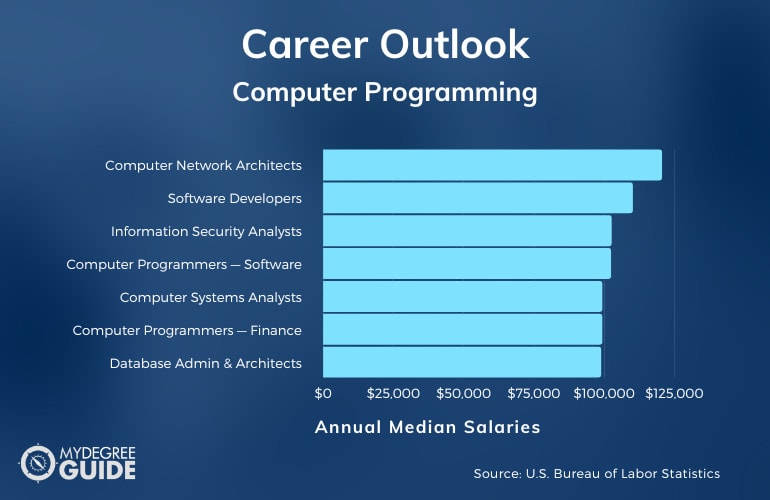Are you wondering how to become a computer programmer? With technology becoming an increasingly significant part of people’s daily lives, computer programming is becoming a popular career path and field of study.

Editorial Listing ShortCode:
You might be thinking that a career as a computer programmer could be right for you. If so, this article will discuss the various pathways you can take to acquire skills related to computer programming and find employment in this growing field.
How to Become a Computer Programmer

Here are some steps you can take if your goal is to become a computer programmer:
- Learn programming. There are many different options available for how to do this. You can earn a computer coding degree online or on campus, you can attend a technical institute or coding bootcamp, or you can study entirely on your own.
- Choose a specialty. Once you have some general knowledge, you may decide whether you want to make your career in front-end development, back-end development, or full-stack development.
- Get an internship in programming or a related field. This step is entirely optional, but it could help you get your first job.
- Build a portfolio. When looking for work as a programmer, it is helpful to be able to show samples of your work to potential clients or employers. If you have not yet done any professional work, you can include projects you’ve completed as a student or intern, or you can build websites on your own.
- Gain work experience. You could seek out full-time employment, or you could work as a freelancer.
- Earn additional certifications. This step is also optional, but continuing education can help you to stay up-to-date on industry trends and to potentially advance your career by qualifying for higher-paying positions.
These steps are simply a guideline. Each individual’s path to becoming a computer programmer is unique to them.
Computer Programmer Education Requirements
While a college degree is not strictly necessary to pursue a career as a computer programmer, some employers may prefer candidates who have degrees.
Editorial Listing ShortCode:
Earning a degree can also give you opportunities to learn computer-related knowledge and skills other than programming. Let’s look at the different levels of degrees that you can pursue in computer science.
Associate’s Degree

An associate’s degree in computer science, information technology, or a related field can enable you to qualify for entry-level tech jobs. Entry-level positions include:
- Computer support specialist
- Computer science programmer
- Network and computer systems administrator
An associate’s degree usually takes 2 years to complete with full-time study, and it can be completed online, on campus, or at a community college. You can take basic courses in computer programming, and you’ll study common programming languages, such as Java and C++.
While the curriculum can vary at different schools, you’ll typically learn about how computers are used in business and educational settings. You’ll also study how to solve common problems that professionals encounter when using technology.
Since an associates degree does not provide time to study how computers operate in depth, the focus of an associates is usually on practical technology skills for the office and similar settings. This level of degree does not usually require a lot of higher-level math or related subjects.
Bachelor’s Degree

A bachelor’s degree in computer science can enable you to qualify for a variety of careers involving computers and technology.
Here are some common computer and IT careers that computer science graduates pursue:
- Computer network architect
- Computer systems analyst
- Database administrator and architect
- Information security analyst
- Software developer
- Web developer and digital designer
A bachelors degree typically takes 4 years to complete, depending on how many classes you take each term. Compared to an associates degree, a bachelors program allows you to develop more theoretical knowledge of how computers work.
Coursework in a computer science bachelors program usually includes the study of discrete mathematics, algorithms, data structures, and similar subjects. Bachelor’s degree students study not only how to write code in multiple languages but also why codes work the way they do. In addition to coding and the theory behind it, computer science students also spend time studying computer hardware and how it works.
Master’s Degree

Once you have developed a broad understanding of computer science by earning your bachelors, you could choose to go on to earn a masters degree. A masters-level program enables you to develop more advanced, specialized knowledge and skills in your chosen field. A masters program usually includes a research project called a thesis as well.
A master’s degree is not necessary to work as a computer programmer or in most other computer science professions. It could be useful, though, if you want to work in academia or do research in an emerging field, such as artificial intelligence or human-computer interaction.
Possible career options for computer science masters degree holders include:
- Computer and information research scientist
- Computer and information systems manager
- Postsecondary teacher
Masters degree programs can vary considerably in length, but they often take 1 to 2 years to complete. Non-thesis programs can usually be completed in less time than programs that include a thesis component.
Computer Programmer Certifications
You could consider earning a professional certification in addition to or in lieu of a traditional degree. Companies such as Oracle and Microsoft offer certification exams that enable software professionals to verify their skill levels in different areas. This can be especially helpful for self-taught programmers.
Editorial Listing ShortCode:
There are also many coding bootcamps where you can take classes for a few months and earn a certificate when you are done. These often do not provide as much knowledge as a full-length traditional degree program, but they can teach you the basic skills to get started as a programmer.
Here are some different certifications you could earn:
- Java: Java is a very common programming language. Learning to use Java, and acquiring a certification in Java, is one of the first basic steps you can take toward becoming a professional programmer. There are many courses and bootcamps that can enable you to become certified in Java.
- GIAC Secure Software: GIAC, or the Global Information Security Assurance Certification, is an organization that offers professional certifications in cybersecurity. Knowledge of cybersecurity can be useful for programmers who want to develop software that is secure. It can also help you qualify for tech jobs other than programming.
- SAS Certified Base Programmers: Becoming an SAS Certified Base Programmer validates that you have basic programming skills, such as being able to correct syntax and programming logic errors. SAS also offers an advanced certificate.
A professional certificate can communicate to employers what specific skills you have in programming and IT.
Computer Programmer Skills

Computer programming is a complex task. There are many different skills that could be useful to you in this field. The following sections will cover the hard and soft skills that can help make you a proficient programmer.
Hard Skills
Hard skills are specific skills that can be easily tested and verified. Here are some hard skills that are useful to a computer programmer:
- Linux: This is a common open-source operating system that’s available for free. Familiarity with Linux is often desirable to employers and may make you more competitive on the job market.
- C++: This is a programming language that is commonly used for desktop applications. It has been around since the 1980s, and it laid the foundation for many other programming languages.
- NET: ASP.NET and ASP.NET Core allow programmers to create web pages that display different content each time they are viewed. Knowledge of ASP.NET and ASP.NET Core is especially useful if you want to create apps or work in web development.
- C#: This is one of the most basic languages all programmers must know. C# is a multi-purpose language that can be used for almost anything, so it is a requirement for most programming jobs.
- SQL: SQL stands for Structured Query Language. SQL is primarily useful for programmers who work in database design and management. Knowledge of SQL can also be useful for non-programming jobs in data analysis.
In general, the more you know about different types of software and programming languages, the easier it can be to qualify for a job in programming.
Soft Skills

Soft skills are general personal qualities that are useful on the job. They can be harder to measure than hard skills, but they are still important. Here are examples of soft skills that are useful for computer programmers:
- Communication: Computer programmers need to understand and follow detailed instructions, ask questions, and make sure they know exactly what their employer or client is looking for.
- Focus: Computer programmers may need to be able to concentrate for long periods of time while writing line after line of code. Skilled programmers often get into a “flow state” while they are working.
- Attention to detail: Even a small mistake in the code could cause software to malfunction, so programmers pay close attention to every detail of their work to ensure that they create a high-quality product.
- Analytical: Computer programming is often a fitting career choice for people who like to solve problems and figure out puzzles. Ideally, a programmer is good at thinking up different angles from which to approach a problem.
- Patience: Getting a code to work may require testing and rewriting it multiple times. A competent programmer is willing to stick with it even when the process takes a long time.
In addition to studying programming languages, cultivating these soft skills can help prepare you for a career as a computer programmer.
Computer Programmer Internship Opportunities

Most high-paying jobs in computer programming require prior work experience. An internship can be a strategic way to get the initial work experience needed to launch your career.
Most internships are unpaid, but if your college or university offers internships as part of your degree program, you may be able to earn course credit for it. When deciding where to attend school, you may want to specifically seek out a school that offers internship opportunities.
If you are attending school on campus, there may be internships available for computer science students that involve working with your school’s IT professionals. There are also internships available at all kinds of companies.
Editorial Listing ShortCode:
Many students try to get internships specifically at tech companies if possible. Since companies in other industries still need programmers, though, you could potentially find an internship opportunity almost anywhere.
An internship can help you get on-the-job training so you can see what it’s like to use computer programming skills outside of a classroom. It can also provide you with opportunities to network with other people in the industry.
Computer Programming Careers & Salaries

According to the Bureau of Labor Statistics, here are some careers related to computer programming.
| Careers | Annual Median Salaries |
| Computer Network Architects | $120,520 |
| Software Developers, Quality Assurance Analysts, and Testers | $110,140 |
| Information Security Analysts |
$102,600 |
| Computer Programmers — Software Publishers | $102,370 |
| Computer Systems Analysts | $99,270 |
| Computer Programmers — Finance and Insurance | $99,260 |
| Database Administrators and Architects |
$98,860 |
| Computer Programmers — Manufacturing | $98,320 |
| Computer Programmers — Computer Systems Design and Related Services | $79,860 |
| Web Developers and Digital Designers | $77,200 |
The Bureau of Labor Statistics projects 13% job growth for computer and IT occupations over the next ten years.
How to Choose a Computer Programming Degree Program
Here are some things you may want to look for when choosing a degree program in computer programming:
- Group projects and opportunities for collaborative work. In most workplaces, computer programmers must function as part of a team. Schools that simulate this type of work can provide better preparation for future employment. Even online degree programs often have platforms for students to discuss things and solve problems together.
- Internship opportunities. Participation in an internship can help you gain real-world experience. An internship is something you can put on a resume, and it can help you meet people who already work in computer programming.
- Archived lectures. One component that can be helpful in an online program is the ability to go back and listen to lectures more than once. This also gives you the ability to use lectures as a resource while trying to solve specific problems.
- Accreditation. You may want to make sure your chosen school has earned regional accreditation. Regional accreditation marks that a school offers high-quality training and credible degrees.
There are many degree programs available that teach computer programming, so you can explore your options to find which ones meet your personal needs and preferences.
What Does a Computer Programmer Do?
A computer programmer writes the code that makes a computer run correctly and efficiently. They may update existing software to fix bugs and errors, rewrite software to make it work on different operating systems, or be involved in the creation of entirely new software.
Editorial Listing ShortCode:
When writing code, programmers often run tests to see how well it works and then rewrite it to fix mistakes. They often work closely with software developers and other professionals to ensure that an application does exactly what it is supposed to do.
Do You Need a Degree to Be a Programmer?

It is not strictly necessary to have a degree to be a programmer. There are lots of ways to learn programming outside of school.
That said, some employers prefer candidates who have degrees, so there may be more job opportunities available to you with a degree. Earning a degree can also help you develop a deeper understanding of how computers work and help you become better at solving certain types of problems.
While you do not need a degree to become a programmer, you may still want to consider the benefits of having a college degree.
Is Computer Programming Hard?

Whether or not computer programming is considered difficult is subjective. It could depend on your natural aptitudes as well as your level of interest in programming.
Computer programming does require systematic problem solving, and coursework in a degree program usually includes advanced math such as calculus and discrete mathematics. Professional computer programmers usually need to be proficient in multiple programming languages. Developing a high level of proficiency in multiple languages could require several years of study and practice.
Some computer programming projects might also be considered more difficult than others. For instance, programming an entire operating system could be both complex and time-consuming, while programming a mobile app might be simpler.
Where Do Computer Programmers Work?

Computer programmers can work for all kinds of companies. According to the Bureau of Labor Statistics, computer programmers most commonly work with computer systems design and related services. The median salary for professionals in this sector is $93,000.
Programmers can also work in finance and insurance, manufacturing, and software publishing. Many are also self-employed. The median salary for programmers who work for software publishers is $102,370 (Bureau of Labor Statistics).
Software developers, quality assurance analysts, and testers are employed by many of the same types of companies as computer programmers. They are somewhat less likely than computer programmers to be self-employed.
What Qualifications Do You Need to Be a Computer Programmer?

What qualifications you need to be a computer programmer depends on where you want to work and exactly what kind of computer programming job you want.
Here are some various qualifications you could earn to help you develop your programming skills:
- Associate’s in computer science or a related field
- Bachelor’s in computer science or a related field
- Certification in a specific product from a vendor like Microsoft or Oracle
- Certificate from a coding bootcamp or course
You may want to browse job postings to see what the specific requirements are for the types of positions you are interested in.
Is Programming a Good Career?

Yes, programming is a good career for many professionals. With technology increasingly working its way into every industry, there are lots of job opportunities in programming and related professions.
Many computer and IT positions pay above average salaries as well. For instance, the median salary for computer programmers is $93,000 (Bureau of Labor Statistics). The Bureau of Labor Statistics currently projects that employment of software developers, quality assurance analysts, and testers will grow by 22% over the next decade. This profession has a median annual salary of $110,140.
Editorial Listing ShortCode:
Employment of web developers and digital designers is expected to grow by 13%, and these professionals have a median salary of $77,200. Of course, your job opportunities will be dependent on a number of factors, such as your geographic location, industry, and work experience.
How Long Does It Take to Become a Computer Programmer?

Exactly how long it takes to become a computer programmer depends on how much education you choose to pursue before getting your first job.
Certificate programs in coding can often be completed in 6 months or less, while an associate’s degree usually takes 2 years to earn. A traditional bachelor’s degree in computer science usually takes 4 years of full-time studies.
If you want to get an internship or pursue education at the graduate level, that could potentially take 1 or 2 years more. It is also possible for you to pursue higher education while you work in the field as a programmer.
How Much Do Computer Programmers Make?

The salary of a computer programmer can vary widely, depending on your work experience, education level, and other factors. According to the Bureau of Labor Statistics, the median annual salary for computer programmers is $93,000. Most make between $47,560 and $155,240.
The median salary for software developers, quality assurance analysts, and testers is $110,140, and the median for web developers and digital designers is $77,200 (Bureau of Labor Statistics). Earnings for computer and IT jobs tend to be higher than the average wage for all occupations.
What’s the Difference Between a Computer Programmer vs. Software Engineer?
Here are some differences between computer programmers and software engineers.
| Computer Programmer | Software Engineer |
|
|
Of course, different companies may vary in exactly how they use these job titles. Software engineers may do some computer programming themselves, and they at least need to be knowledgeable enough about the subject to communicate with programmers.
What’s the Difference Between a Coder vs. Programmer?

The term “programmer” is a little bit broader than “coder” since it may include other responsibilities besides coding.
Here are some differences between the two roles:
- Programmer: Programmers plan out software from start to finish, usually using flowcharts to decide what the software should do.
- Coder: In some cases, a coder’s job is simply to write code, following the plans created by the programmer.
There is often an overlap between programming and coding, and many professionals do both. Also, different companies may vary in exactly how they use these terms.
Getting Your Computer Programming Degree Online

With the technology industry growing so rapidly, now is a strategic time to study computer programming or to earn a degree in computer science or a related field.
The study of computer programming is very conducive to online learning. Programming students tend to spend a lot of time in front of their computers, regardless of whether they opt for online or on-campus instruction. An online degree in computer programming can provide the flexibility to continue working while you develop new skills and credentials to add to your resume.
If you’re ready to start your educational journey, you can begin by exploring computer programming degrees from accredited colleges and universities today!

